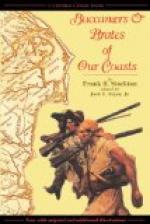But their plans did not work very well; they were discovered by some Indians, after they had landed, who hurried to Merida and gave notice of the approach of the buccaneers. Consequently, when Roc and his companions reached the town they found the garrison prepared for them, cannons loaded, and all the approaches guarded. Still the pirates did not hesitate; they advanced fiercely to the attack just as they were accustomed to do when they were boarding a Spanish vessel, but they soon found that fighting on land was very different from fighting at sea. In a marine combat it is seldom that a party of boarders is attacked in the rear by the enemy, although on land such methods of warfare may always be expected; but Roc and Tributor did not expect anything of the kind, and they were, therefore, greatly dismayed when a party of horsemen from the town, who had made a wide detour through the woods, suddenly charged upon their rear. Between the guns of the garrison and the sabres of the horsemen the buccaneers had a very hard time, and it was not long before they were completely defeated. Tributor and a great many of the pirates were killed or taken, and Roc, the Brazilian, had a terrible fall.
This most memorable fall occurred in the estimation of John Esquemeling, who knew all about the attack on Merida, and who wrote the account of it. But he had never expected to be called upon to record that his great hero, Roc, the Brazilian, saved his life, after the utter defeat of himself and his companions, by ignominiously running away. The loyal chronicler had as firm a belief in the absolute inability of his hero to fly from danger as was shown by the Scottish Douglas, when he stood, his back against a mass of stone, and invited his enemies to “Come one, come all.” The bushy-browed pirate of the drawn cutlass had so often expressed his contempt for a soldier who would even surrender, to say nothing of running away, that Esquemeling could scarcely believe that Roc had retreated from his enemies, deserted his friends, and turned his back upon the principles which he had always so truculently proclaimed.
But this downfall of a hero simply shows that Esquemeling, although he was a member of the piratical body, and was proud to consider himself a buccaneer, did not understand the true nature of a pirate. Under the brutality, the cruelty, the dishonesty, and the recklessness of the sea-robbers of those days, there was nearly always meanness and cowardice. Roc, as we have said in the beginning of this sketch, was a typical pirate; under certain circumstances he showed himself to have all those brave and savage qualities which Esquemeling esteemed and revered, and under other circumstances he showed those other qualities which Esquemeling despised, but which are necessary to make up the true character of a pirate.
The historian John seems to have been very much cut up by the manner in which his favorite hero had rounded off his piratical career, and after that he entirely dropped Roc from his chronicles.




